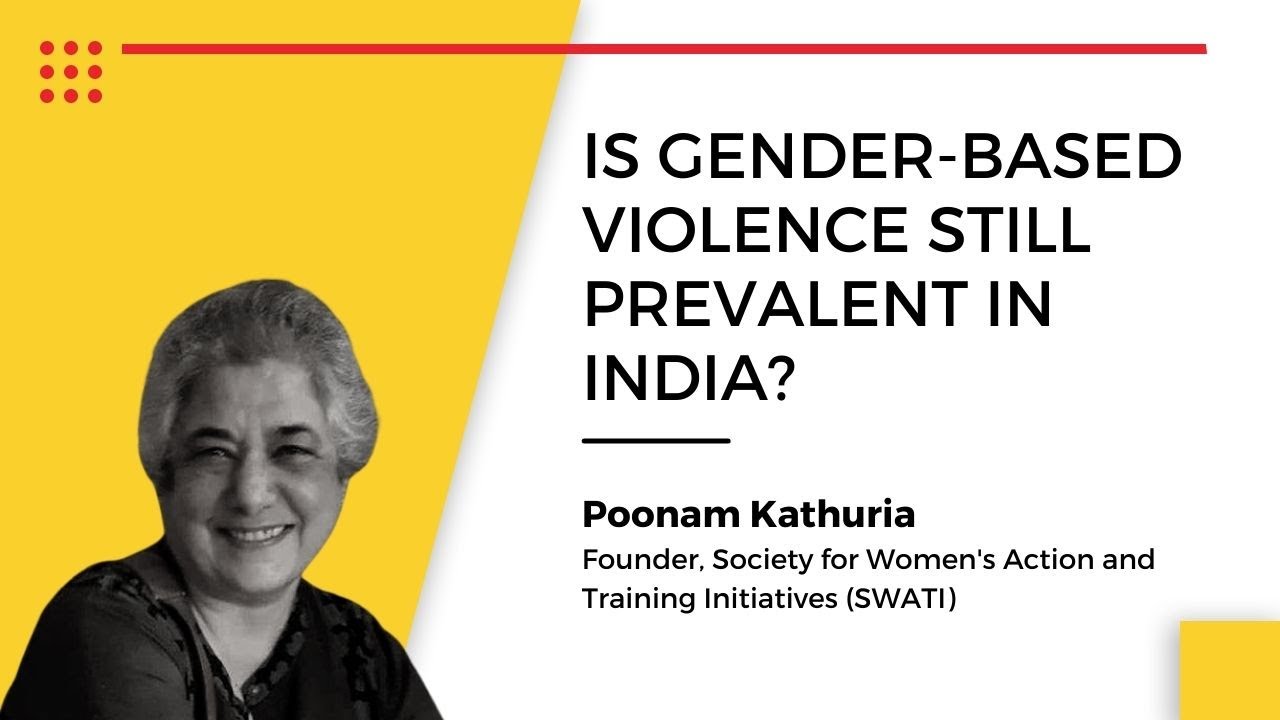Poonam Kathuria, Founder, Society for Women’s Action and Training Initiatives (SWATI)
While my skill set is diverse, my greatest expertise revolves around the issue of violence against women, and effective implementation of laws and services for survivors of VAW.
Podcast
Overview
“When you address gender based violence is when you address structures.”
The indian society is deeply rooted in patriarchy and male dominated cultural systems. This dominance has led to the other genders taking a secondary position in society. Since male superiority is evidently present in every section of society, the power dynamics between the genders is highly tilted in the favour of men. Gender inequality and gender based violence are the results of this extreme male dominance.
India reports a very high number of gender based violence both in urban as well as in rural areas. The outbreak of the Corona virus which led to a global pandemic increased the number of gender based violence in the country,
Today on the podcast we have a very accomplished woman fighting against gender based violence and who is also helping others to do so. We are pleased to welcome Poonam Kathuria on the show today!
Poonam Kathuria. Poonam is the Founder of the Society for Women’s Action and Training Initiatives (SWATI). SWATI is an organisation that works on issues related to violence against women. Poonam has been recognised and Felicitated globally.
In this interview with Ashutosh Garg, poonam shares the scope of work that is done by her organisation SWATI. She talks about the gender based violence in the country and shares some very shocking statistics. She also points out the systematic faults that fail to bring the survivors to justice and talks about the problematic attitude of police officers.
A woman led feminist organisation, SWATI works towards counselling violence survivors across the country and helping them deal with their trauma and removing them from dangerous situations.
Poonam believes that while there are major laws against violence in India, it is the implementation that is a failure. She talks about her experiences in rural villages and small communities and shares some very intriguing stories of survivors.
Tune in to this very interesting interview and learn more about Poonam’s fight against gender violence and the thoughts of a feminist regarding the stance of judicial laws in the country.
Profile
For a large part of my growing up years I was a troubled soul struggling to come to terms with my own rebellion and things that did not make sense to me. Poverty does not make sense to me till today. My formal education – a Bachelor’s in economics and political science and a Master’s in economics did not help much. A two year fellowship in development thought and social change became the space where I finally began to feel comfortable and accepted.
I did initially foray into diverse fields – environment, capacity building, documentation, communication. Working on women’s issues of justice, rights and entitlement is where I finally discovered my purpose. At the age of 32 I founded Society for Women’s Action and Training Initiatives – SWATI, an organization that works on issues related to all forms of violence against women (VAW), Citizenship and political participation, women’s health, and governance.
While my skill set is diverse, my greatest expertise revolves around the issue of violence against women, and effective implementation of laws and services for survivors of VAW. I believe that questioning violence against women is the only way ‘to’ question structures of discrimination emanating from patriarchy and masculinist institutions. Emanating from my own sense of dissatisfaction and discrimination my work continues to be a tremendous source of personal fulfillment.
A holistic and cross-sector approach to responding to the complex nature of development challenges has been central to my work. In my professional sphere I bridge the divide between practice and academia; this has helped me to resist over simplification of issues. I am recognized for my innovative ideas, strategic thinking and conceptual skills. I have therefore been invited to carry out capacity building, assessment, and strategy formulation exercises by Aga Khan Foundation, Sir Dorabji Tata Trust, MacArthur Foundation, Mahila Samakhya Society, among others.
In the year 2014, I was awarded the Dame Nita Barrow Distinguished Visitorship for 2014 at the Ontario Institute for Studies in Education, University of Toronto, and taught a special course at the University of Toronto during the period 2014 June to September 2014. This opportunity allowed me to step back and spend some time in reflection, study and dialogue to deepen the analysis of women’s development and rights practice in the context of my work, and beyond it.


